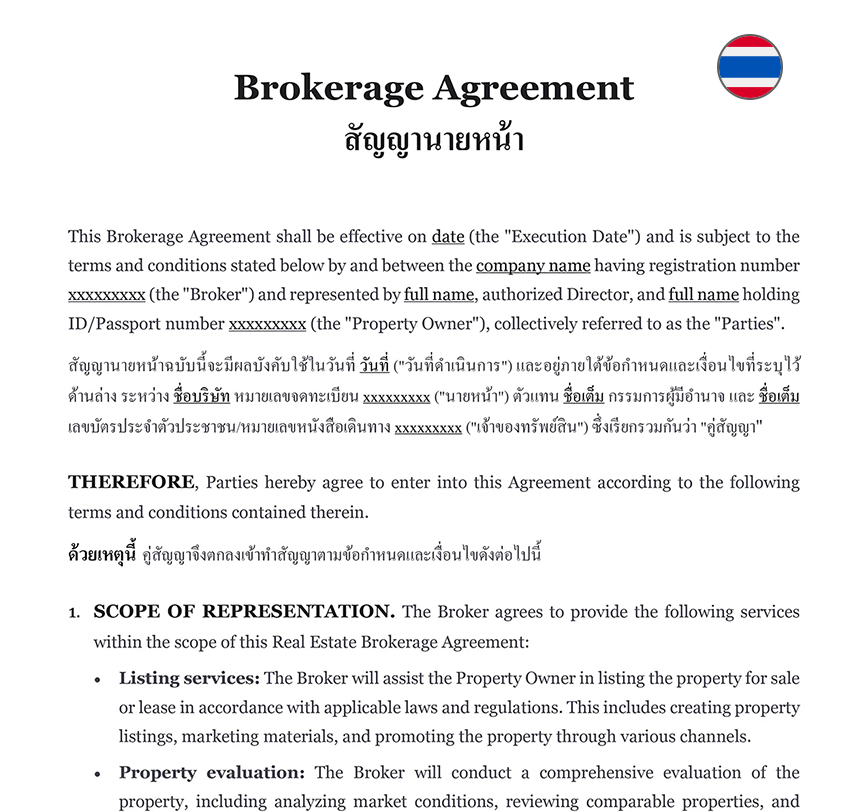Ready to use legal template
Drafted by experienced lawyers
Certified Thai-English translation
Ready to use legal template
Drafted by lawyers
Translated in Thai-English
Home › Buy a property › Brokerage Agreement
Learn more about Brokerage Agreement in Thailand
This Brokerage Agreement delineates the terms and conditions governing the collaborative efforts to market, list, and facilitate the sale, purchase, or lease of properties. With Themis Partner, navigating the intricacies of real estate transactions becomes effortless. Our customizable legal template, meticulously crafted by seasoned lawyers to align with Thailand’s legal framework, empowers you to draft a comprehensive and legally sound Brokerage Agreement tailored to your specific needs. Experience the confidence of a well-structured agreement, paving the way for successful real estate endeavors.
Table of contents
-
What is a Brokerage Agreement in Thailand?
-
Why is a Brokerage Agreement important?
-
What does a Brokerage Agreement include?
-
How is the broker's commission calculated?
-
Can I work with multiple brokers simultaneously?
-
How does it protect my interests?
-
What are the legal considerations in a Brokerage Agreement?
What is a Brokerage Agreement in Thailand?
A Brokerage Agreement in Thailand is a legally binding contract between a property owner or seller and a licensed real estate broker or agent. This agreement outlines the terms and conditions under which the broker will provide services related to the marketing, listing, sale, purchase, or lease of a property on behalf of the owner. The Brokerage Agreement serves as a formal arrangement that defines the roles, responsibilities, and compensation of both parties involved in a real estate transaction within the legal framework of Thailand. It aims to establish clear expectations, protect the interests of both the property owner and the broker, and ensure a smooth and transparent property transaction process.
Why is a Brokerage Agreement important?
A Brokerage Agreement is essential for transparent and successful real estate transactions in Thailand. It provides clarity on roles and responsibilities, offers legal protection, ensures compliance with regulations, and outlines marketing strategies. This agreement establishes fair compensation terms, sets a professional tone, and acts as a reference point for resolving disputes. Overall, it creates a transparent and efficient framework for property transactions while safeguarding the interests of both property owners and real estate brokers.
What does a Brokerage Agreement include?
A Brokerage Agreement in Thailand typically includes the following key components:
1. Parties Involved
Clearly identifies the property owner or seller and the licensed real estate broker or agent who will be representing them in the transaction.
2. Property Details
Describes the property being listed, including its address, type (residential, commercial, etc.), and any relevant features.
3. Broker's Responsibilities
Outlines the specific tasks and services that the broker will provide, such as property marketing, listing, showings, negotiations, and facilitating the transaction.
4. Marketing Strategies
Details the broker’s plans for marketing and promoting the property to potential buyers or tenants, including online listings, advertising, and open houses.
5. Compensation and Commission
Specifies the broker’s compensation, which is often calculated as a percentage of the property’s sale or lease price. The agreement also outlines when and how the commission will be paid.
6. Exclusive vs. Non-Exclusive
States whether the agreement is exclusive (the broker has exclusive rights to market the property) or non-exclusive (the property owner can work with multiple brokers).
7. Duration of Agreement
Defines the duration of the agreement, including the start and end dates. It may also include provisions for automatic renewal or termination.
8. Termination Clause
Outlines the conditions under which either party can terminate the agreement before its expiration, including notice periods and reasons for termination.
9. Listing Price and Terms
Specifies the listing price for the property and any terms or conditions related to the sale or lease, such as contingencies or financing arrangements.
10. Legal Obligations
Addresses legal responsibilities and obligations of both parties, including compliance with local real estate laws, regulations, and ethical standards.
11. Dispute Resolution
Includes provisions for resolving disputes that may arise during the transaction process, such as mediation or arbitration.
12. Confidentiality
Contains provisions to protect sensitive information related to the property, transaction, and parties involved.
13. Governing Law
Specifies the Thai jurisdiction and laws that will govern the agreement.
How is the broker's commission calculated?
The calculation of a broker’s commission in a Real Estate Brokerage Agreement can vary, but it’s commonly based on a percentage of the total sale price or lease amount of the property. Here’s how the commission is typically calculated:
1. Percentage of Sale Price: The most common method is to calculate the commission as a percentage of the total sale price of the property. This percentage is agreed upon between the property owner and the broker and is often specified in the agreement. The typical commission percentage can range from 3% to 6%, but this can vary based on factors such as location, property type, and market practices.
2. Percentage of Lease Amount: For lease agreements, the commission may be calculated as a percentage of the total lease amount, often equivalent to a certain number of months’ rent. The commission rate for leasing may also vary based on market conditions.
3. Tiered Commission: In some cases, a tiered commission structure may be used. This means that the commission percentage increases as the sale or lease price of the property goes higher. For example, the commission might be 5% for the first THB 100,000, and then 6% for any amount above THB 100,000.
4. Fixed Fee: Instead of a percentage, a fixed fee may be negotiated between the property owner and the broker. This approach is less common but may be used for specific types of properties or arrangements.
5. Lease Renewal or Extension: In some agreements, the broker’s commission may also apply to lease renewals or extensions if specified in the agreement.
It’s important for property owners to clearly understand how the broker’s commission will be calculated and to have this information detailed in the Brokerage Agreement.
ℹ️ The agreement should also outline when and how the commission will be paid (e.g., upon closing of the sale) and any other relevant terms related to compensation.
Can I work with multiple brokers simultaneously?
You have the option to work with multiple real estate brokers simultaneously, but it’s important to consider whether your agreements are exclusive or non-exclusive. Clear communication, coordination, and transparency are crucial if you choose to work with multiple brokers. Each broker’s commission structure should be well-defined, and you should be prepared to manage potential overlapping efforts and logistical challenges. Ensure that you adhere to termination clauses and legal requirements if you decide to exclusively work with one broker or make changes to your arrangement. Seeking legal advice will help ensure compliance with local laws and ethical standards throughout the process.
How does it protect my interests?
A Brokerage Agreement safeguards your interests by providing a clear and legally binding framework for property transactions. It ensures both parties understand their roles, responsibilities, and compensation terms, reducing misunderstandings and potential disputes. The agreement establishes exclusive rights, protects confidential information, and outlines termination conditions. It also ensures compliance with legal regulations, maintains professional standards, and offers a dispute resolution process. Overall, this agreement enhances transparency, professionalism, and accountability, ensuring a successful and secure real estate transaction while prioritizing your interests.
What are the legal considerations in a Brokerage Agreement?
Legal considerations in a Real Estate Brokerage Agreement encompass various aspects that ensure the agreement’s validity, compliance with laws, and protection of both parties’ interests. Key points include verifying the broker’s licensing, clearly defining terms and conditions, commission structure, and disclosure obligations. The agreement should address exclusive or non-exclusive arrangements, termination clauses, confidentiality, liability, and indemnification. Adherence to local regulations, electronic signature legality, and professional standards are essential. To ensure a legally sound agreement, consulting with legal experts specializing in real estate law is crucial. This safeguards your rights, prevents disputes, and establishes a framework for a secure and transparent property transaction.
Brokerage AgreementTemplate (.docx)
Save on attorney fees
310 client reviews (4.8/5) ⭐⭐⭐⭐⭐
Share information
Why Themis Partner?
Easy legal documents at your fingertips
Make trusted documents for hundreds of purposes.
Hundreds of documents
Instant access to our entire library of documents for Thailand.
24/7 legal support
Quick legal advice from our network of qualified lawyers.
Easily customized
Editable Word documents, unlimited revisions and copies.
No translation fees
Certified Thai-English translation included for all documents.
Legal and Reliable
Documents written by lawyers that you can use with confidence.
Free consultation
Free lawyer consultation on each new matter.




